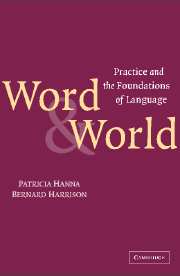1 - The Prison-House of Language
Published online by Cambridge University Press: 05 June 2012
Summary
Scepticism and the content of “commonsense”
We think, and we speak our thoughts. Necessarily we speak them, even to ourselves, in some language, either in a so-called natural one – French, English, Hebrew, Greek – or in one of the so-called artificial languages of mathematics or formal logic. Whatever language we choose to speak, or must speak, however, we take ourselves often enough, most often perhaps, to be speaking in it of real things: things “real” in the sense, a sense introduced to philosophy by Descartes, and the source of much enduring intellectual anguish since, of being “outside the mind.”
But are not words themselves creatures of language? Is language itself not a creation of the human mind? If so, what assurance have we that, when we speak, we speak of the furniture of the universe, of Reality itself, rather than merely of the homely, and home-made, furniture of our own minds?
In raising such doubts we envisage the possibility that language, although it may seem the house of the mind, with windows opening on an extramental, extralinguistic world, may in fact be a prison, with none. The image of language as a prison no doubt owes something, historically, to Plato's myth of the Cave. But those immured in the Prison-House of Language, as philosophers since Locke have conceived it, are rather worse off than those chained facing the back wall of Plato's Cave.
- Type
- Chapter
- Information
- Word and WorldPractice and the Foundations of Language, pp. 17 - 25Publisher: Cambridge University PressPrint publication year: 2003

